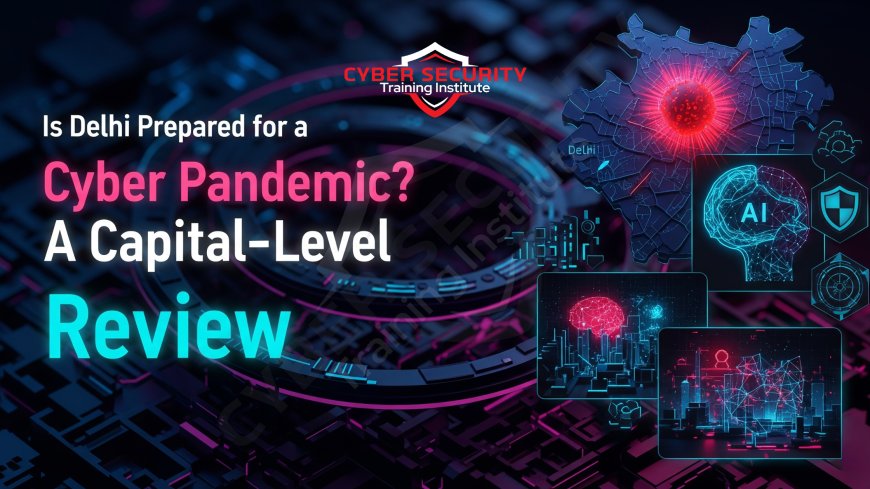Is Delhi Prepared for a Cyber Pandemic? A Capital-Level Review
In today’s digital age, a cyber pandemic—a large-scale, disruptive cyberattack—could cripple a city as vital as Delhi. Imagine waking up to find banking systems frozen, traffic signals malfunctioning, or government databases compromised. Delhi, India’s bustling capital, is a hub of governance, commerce, and culture. But is it ready to face a cyber crisis of this magnitude? This blog dives into Delhi’s cybersecurity landscape, exploring its strengths, weaknesses, and what needs to be done to prepare for a potential cyber pandemic. From government initiatives to private sector efforts, we’ll assess the city’s readiness, highlight key vulnerabilities, and offer insights into how Delhi can fortify itself against digital threats. Whether you’re a resident, policymaker, or tech enthusiast, this post will break down complex concepts into simple terms, shedding light on a topic that affects us all.

Table of Contents
- What is a Cyber Pandemic?
- Delhi’s Digital Landscape: An Overview
- Current Cybersecurity Measures in Delhi
- Key Vulnerabilities in Delhi’s Infrastructure
- The Role of Public Awareness
- Steps Toward a Cyber-Resilient Delhi
- Conclusion
- Frequently Asked Questions
What is a Cyber Pandemic?
A cyber pandemic is a widespread, highly disruptive cyberattack that impacts critical systems across sectors like healthcare, finance, transportation, and government. Unlike a single hack, a cyber pandemic spreads rapidly, exploiting interconnected systems to cause chaos. Think of it like a digital virus, infecting everything from power grids to personal devices.
For Delhi, a cyber pandemic could mean paralyzed public services, disrupted businesses, and compromised personal data. With the city’s heavy reliance on digital infrastructure—think Aadhaar, online banking, or smart traffic systems—the stakes are high. Understanding this threat is the first step toward preparing for it.
Delhi’s Digital Landscape: An Overview
Delhi is a digital powerhouse. As India’s capital, it hosts critical government systems, major corporations, and a growing number of tech startups. The city’s digital infrastructure includes:
- Government Systems: Aadhaar, e-governance portals, and tax systems.
- Private Sector: Banking apps, e-commerce platforms, and IT services.
- Public Services: Smart traffic systems, metro networks, and healthcare databases.
- Connectivity: Widespread 4G/5G networks and public Wi-Fi initiatives.
However, this digital growth comes with risks. The more connected a city is, the larger its “attack surface”—the points hackers can target. Delhi’s rapid digitization, while a strength, also makes it a prime target for cyberattacks.
Current Cybersecurity Measures in Delhi
Delhi benefits from India’s national cybersecurity framework, but local efforts are also in place. Here’s a look at the key measures:
- National Cyber Security Policy (2013): Guides Delhi’s cybersecurity strategy, focusing on protecting critical infrastructure.
- Indian Computer Emergency Response Team (CERT-In): Responds to cyber incidents and coordinates with Delhi’s authorities.
- Delhi Police Cybercrime Unit: Handles cyber fraud, hacking, and online scams.
- Private Sector Initiatives: Banks and IT firms in Delhi use firewalls, encryption, and regular security audits.
Despite these efforts, implementation varies. For example, while CERT-In provides guidelines, smaller organizations in Delhi often lack the resources to follow them. The table below summarizes Delhi’s cybersecurity strengths and gaps:
| Aspect | Strengths | Gaps |
|---|---|---|
| Government Systems | Strong encryption, regular audits | Legacy systems, slow updates |
| Private Sector | Advanced cybersecurity tools | Inconsistent adoption by SMEs |
| Public Awareness | Growing awareness campaigns | Low cybersecurity literacy |
Key Vulnerabilities in Delhi’s Infrastructure
Delhi’s digital ecosystem has several weak points that could be exploited in a cyber pandemic:
- Legacy Systems: Many government and public systems use outdated software, making them easy targets.
- Overreliance on Aadhaar: A breach in Aadhaar’s database could expose millions of residents’ data.
- Public Wi-Fi Networks: Free Wi-Fi in markets and metro stations often lacks strong security.
- SMEs and Startups: Small businesses in Delhi often skimp on cybersecurity due to budget constraints.
- Human Error: Phishing attacks exploit unaware employees or citizens, a major risk in a densely populated city.
These vulnerabilities highlight the need for a coordinated response to strengthen Delhi’s defenses.
The Role of Public Awareness
Cybersecurity isn’t just about technology—it’s about people. In Delhi, where millions use smartphones and online services daily, public awareness is critical. Many residents fall victim to phishing emails, fake apps, or unsecured Wi-Fi because they don’t know the risks.
Government campaigns, like those by CERT-In, aim to educate people on safe online practices. Schools and colleges in Delhi are starting to include cybersecurity in their curricula, but progress is slow. Simple steps, like using strong passwords or avoiding suspicious links, could prevent many attacks if widely adopted.
Steps Toward a Cyber-Resilient Delhi
To prepare for a cyber pandemic, Delhi needs a multi-pronged approach:
- Upgrade Infrastructure: Replace outdated systems with secure, modern alternatives.
- Public-Private Partnerships: Encourage collaboration between government and tech firms to share resources and expertise.
- Training Programs: Offer cybersecurity training for government employees, businesses, and citizens.
- Incident Response Plans: Develop city-wide plans to respond quickly to cyberattacks.
- Legislation: Enforce stricter cybersecurity regulations for critical sectors like healthcare and finance.
By investing in these areas, Delhi can build a robust defense against cyber threats, ensuring the city remains functional even during a crisis.
Conclusion
Delhi stands at a crossroads in its digital journey. While the city has made strides in cybersecurity, significant gaps remain. Legacy systems, low public awareness, and uneven adoption of security measures leave Delhi vulnerable to a cyber pandemic. However, with coordinated efforts—upgrading infrastructure, fostering partnerships, and educating citizens—Delhi can become a model of cyber resilience. The time to act is now, before a digital crisis tests the capital’s limits.
Frequently Asked Questions
What is a cyber pandemic?
A cyber pandemic is a large-scale cyberattack that disrupts critical systems across multiple sectors, spreading rapidly like a virus.
Why is Delhi at risk of a cyber pandemic?
Delhi’s heavy reliance on digital systems, like Aadhaar and smart infrastructure, makes it a prime target for cyberattacks.
What systems in Delhi are most vulnerable?
Legacy government systems, public Wi-Fi, and small businesses with weak cybersecurity are major vulnerabilities.
How can a cyber pandemic affect daily life in Delhi?
It could disrupt banking, transportation, healthcare, and government services, causing widespread chaos.
What is CERT-In’s role in Delhi’s cybersecurity?
CERT-In coordinates cyber incident responses and provides guidelines to protect Delhi’s digital infrastructure.
Are Delhi’s banks secure against cyberattacks?
Major banks use advanced security, but smaller institutions and customers are still at risk from phishing and fraud.
How does Aadhaar impact Delhi’s cybersecurity?
Aadhaar’s vast database is a strength but also a target; a breach could expose millions of residents’ data.
What is phishing, and why is it a problem in Delhi?
Phishing involves tricking people into sharing sensitive information. It’s common in Delhi due to low awareness.
Can public Wi-Fi in Delhi be trusted?
Public Wi-Fi often lacks strong security, making it risky for sensitive tasks like banking.
How is the Delhi Police tackling cybercrime?
The Delhi Police Cybercrime Unit investigates cyber fraud, hacking, and scams, but resources are limited.
What can Delhi residents do to stay safe online?
Use strong passwords, avoid suspicious links, and keep software updated to reduce risks.
Are small businesses in Delhi prepared for cyberattacks?
Many lack the budget for robust cybersecurity, making them easy targets for hackers.
How can the government improve Delhi’s cybersecurity?
By upgrading systems, enforcing regulations, and running awareness campaigns, the government can strengthen defenses.
Do schools in Delhi teach cybersecurity?
Some schools are starting to include cybersecurity in their curricula, but it’s not yet widespread.
What is a legacy system, and why is it a risk?
Legacy systems are outdated technologies that are harder to secure, making them vulnerable to attacks.
Can a cyber pandemic affect Delhi’s metro system?
Yes, a cyberattack could disrupt ticketing or signaling systems, halting metro operations.
How do public-private partnerships help cybersecurity?
They allow sharing of expertise and resources to build stronger defenses against cyber threats.
What is an incident response plan?
It’s a strategy to quickly address and recover from cyberattacks to minimize damage.
Is Delhi’s healthcare sector ready for a cyber pandemic?
Some hospitals have strong security, but many lack the resources to fully protect patient data.
How can Delhi become cyber-resilient?
By upgrading infrastructure, educating citizens, and enforcing strict cybersecurity policies, Delhi can prepare for digital threats.
What's Your Reaction?
 Like
0
Like
0
 Dislike
0
Dislike
0
 Love
0
Love
0
 Funny
0
Funny
0
 Angry
0
Angry
0
 Sad
0
Sad
0
 Wow
0
Wow
0














